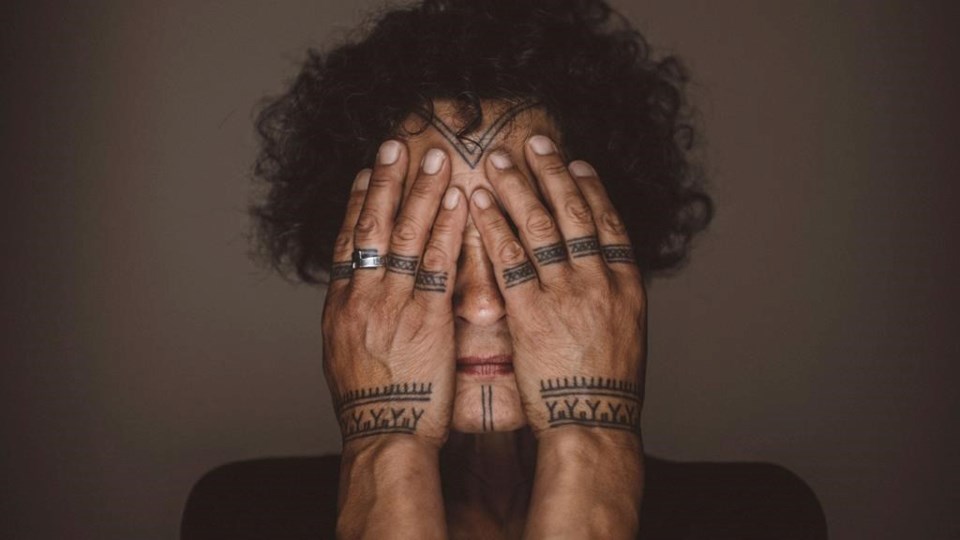TORONTO — At the Copenhagen premiere of the new documentary “Twice Colonized” in March, a young Greenlandic woman stood up in the audience and offered Aaju Peter “a beautiful moment of realization.”Â
“She said that it was the first time she had seen an image of herself being portrayed on a big screen,” Peter, a renowned Inuk activist, lawyer and the film's main subject, said in a video interview.Â
“That meant so much to me because we need to tell our story, not only the good side but also show that you can go through hardships and learn to deal with it.”
The experience further underlined why the 63-year-old born in Arkisserniaq, a village in the north of Kalaallit Nunaat -- also known as Greenland -- agreed to be in front of Danish filmmaker Lin Alluna's lens. Peter is also one of the film's executive producers and writers.Â
"Twice Colonized," which opened Toronto's 2023 Hot Docs film festival, centres on Peter, who has been an ardent defender of the rights of Indigenous Peoples in Denmark, Greenland and Canada.
Alluna shadowed Peter over the course of seven years, capturing her liberation from personal traumas and anger — including her forced assimilation and the unexpected death of her youngest son — and her pursuits to establish an Indigenous forum at the European Union.Â
“It's scary to just have somebody film you for all those years because they capture everything,” said Peter. “It’s a scary process to be so vulnerable and trusting, but I think Inuit are very trusting people and we believe the best in people — they took that trust to portray both sides of my story.”Â
After her parents sent her to Denmark to attend high school and live alone, as was the custom at the time, Peter said she was ultimately surrounded by those who didn't care about or understand her culture as she moved from one place to the next.Â
“When you try to whiten-ize little Inuit, you separate them from their parents…you separate them from their peers,” she says in “Twice Colonized.”
It's a documentary that covers the highs and lows of her journey as a campaigner, activist, and lawyer who often worked as an adviser for both the United Nations and the European Union — a task motivated by a familiar feeling of having one’s identity stripped away.Â
“When I would go to the European Parliament to protest their anti-sealing legislation and how wrong they were, I was all by myself and felt so alone…so tiny and minuscule,” said Peter, who currently resides in Iqaluit, the capital of Nunavut.
“I felt like a fly on the wall to them…they are legislating our culture, our economy, and our society through the backdoor and they are all the way in Europe, so I know how important it has been to have Indigenous Peoples represented in the European Union so we can have a collective voice.”
Peter said she prefers to marry the issues she tackles before courts or legislative bodies with her own life trials to illustrate that she isn’t a "100-year-old romanticized vision of an Inuit survivor."
For the majority of the 92-minute documentary, Peter allows the camera to venture in strikingly close, exposing her moments of grief. In the film, she is shedding tears over old footage of her youngest son singing “I Love You Too Much” by Diego Luna and having curse-filled arguments with her then-boyfriend, who objected to the making of the film.Â
Alethea Arnaquq-Baril, activist, “Twice Colonized” co-producer, and director of 2016 seal hunting doc “Angry Inuk,” said she experienced mixed emotions watching a woman she idolized as a child be so vulnerable.Â
“On the surface of things it was heart-wrenching to see her struggle with things that happened to her that weren’t her fault,” said Arnaquq-Baril. “On another, it was obviously inspiring because a story like hers helps you feel as if you can keep going….it pushes me to be more brave.”
Arnaquq-Baril, who featured Peter in her previous projects “Angry Inuk” and "Tunniit: Retracing the Lines of Inuit Tattoos,” says she joined "Twice Colonized" in 2019 after Peter brought Alluna to an invite-only dinner of hers, camera in hand.Â
“She was just this random white lady that showed up with a camera on and I was like, what’s going on?” she said through laughter in reference to the filmmaker she now calls a friend.Â
When Lin approached co-producers Emile Hertling PĂ©ronard, Stacey Aglok MacDonald and Arnaquq-Baril about joining the project, it took seeing footage of Peter to convince them the documentary would be sensitive to the Inuit.
Working with Alluna to paint a different picture of Peter also shifted Arnaquq-Baril's own views about herself.Â
“I tried to make a close and personal film with Aaju in “Angry Inuk” and it ended up being more of an issue-based film instead because I didn’t know how to pull that other side of her,” she said.Â
“I’ve idolized her since she was a kid and it must have been difficult for her to just be a person in front of me…it just reminds me that I need to be human always and not worry about being a role model…it’s inspired me to just allow myself to be myself.”Â
For Peter, the mission has always been centring and elevating the humanity of her people.
“I’ve realized during these interviews that our ancestors have been here ten times longer than Westerners, Europeans who came to Canada and colonized us and it’s important to recognize that we should be the government,” said Peter.
“We should be standing up higher to lead the country where there is so much respect for the environment. Inuit and Indigenous Peoples in Europe and Canada need to be heard."
 "Twice Colonized" will be shown in select Canadian theatres throughout May.
This report by The Canadian Press was first published May 10, 2023.
Noel Ransome, The Canadian Press



